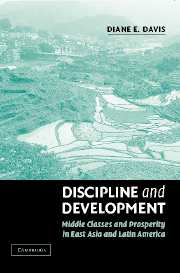Book contents
- Frontmatter
- Contents
- Preface
- DISCIPLINE AND DEVELOPMENT
- 1 An Introduction to Middle Classes, Discipline, and Development
- 2 Middle Classes and Development Theory
- 3 Discipline and Reward: Rural Middle Classes and the South Korean Development Miracle
- 4 Disciplinary Development as Rural Middle-Class Formation: Proletarianized Peasants and Farmer-Workers in Argentina and Taiwan
- 5 From Victors to Victims? Rural Middle Classes, Revolutionary Legacies, and the Unfulfilled Promise of Disciplinary Development in Mexico
- 6 Disciplinary Development in a New Millennium: The Global Context of Past Gains and Future Prospects
- Appendix A Cases, Comparisons, and a Note on Methodology and Sources
- Appendix B Defining the Middle Class: Notes on Boundaries and Epistemology
- Appendix C Tables
- Bibliography
- Index
6 - Disciplinary Development in a New Millennium: The Global Context of Past Gains and Future Prospects
Published online by Cambridge University Press: 31 July 2009
- Frontmatter
- Contents
- Preface
- DISCIPLINE AND DEVELOPMENT
- 1 An Introduction to Middle Classes, Discipline, and Development
- 2 Middle Classes and Development Theory
- 3 Discipline and Reward: Rural Middle Classes and the South Korean Development Miracle
- 4 Disciplinary Development as Rural Middle-Class Formation: Proletarianized Peasants and Farmer-Workers in Argentina and Taiwan
- 5 From Victors to Victims? Rural Middle Classes, Revolutionary Legacies, and the Unfulfilled Promise of Disciplinary Development in Mexico
- 6 Disciplinary Development in a New Millennium: The Global Context of Past Gains and Future Prospects
- Appendix A Cases, Comparisons, and a Note on Methodology and Sources
- Appendix B Defining the Middle Class: Notes on Boundaries and Epistemology
- Appendix C Tables
- Bibliography
- Index
Summary
Where to Now?
In this book I have tried to resurrect the analytic centrality of middle classes in development theory while also rescuing a focus on history and domestic politics in the study of late industrialization. With evidence drawn from four late-developing countries, combined with analysis of several “early” developers, I have offered an argument that travels in time and across regions. My claim is that successful economic development depends on a confluence of state and societal capacities to discipline capitalists in a spatial context where such actions can reinforce strong forward and backward linkages between industrial and agricultural sectors of the economy. Rural middle classes have been key actors in achieving these aims, particularly when they are embedded in the state or other equivalent institutions with coercive or policy-making power. In seeking to account for the conditions that made this likely, I identified a variety of historical factors – including legacies of urbanization and militarization, patterns of middle-class formation, processes of state formation, and ethnicity as well as the cultural practices and national politics sustaining the sway of these actors, identities, processes, and institutions – that together determined the likelihood that disciplining of capitalists occurred and sustained economic development resulted. In this sense, historical contingency and path dependency are considered as central to developmental successes as any rational bureaucratic commitment to finding the “proper” macroeconomic policy techniques and prescriptions.
- Type
- Chapter
- Information
- Discipline and DevelopmentMiddle Classes and Prosperity in East Asia and Latin America, pp. 340 - 358Publisher: Cambridge University PressPrint publication year: 2004



